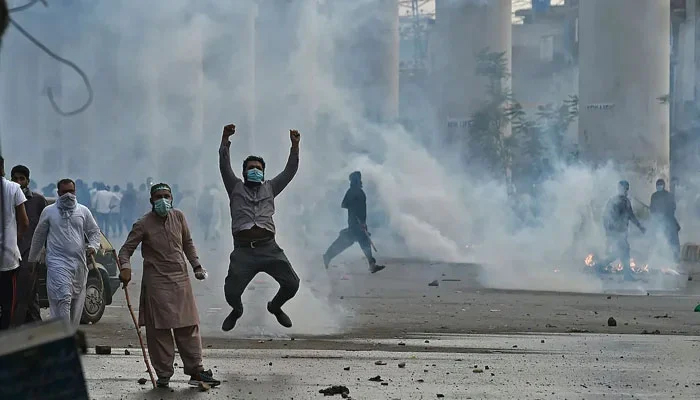Faizabad questions
The Supreme Court (SC) has rejected the government’s fact-finding committee in the Faizabad sit-in case. The fact-finding committee was constituted by the government on October 19, to investigate the “role and directions” of all “concerned” officials in the management and handling of the sit-in in 2017 staged by the Tehreek-e-Labbaik Pakistan (TLP) against the then-PML-N government. A three-member SC bench comprising Chief Justice Qazi Faez Isa, Justice Aminuddin Khan and Justice Athar Minallah heard the petitions challenging the ruling yesterday. The issue of the seriousness of the government was raised in the hearings, with CJP Isa asking a most pertinent question: “We want to know who was the mastermind of the Faizabad sit-in.” This is a question that has been whispered but never quite articulated in the open on an institutional level.
The SC has now ordered the government to form a new inquiry commission. Legal experts say that a fact-finding committee is not legally binding on anyone, which is why the CJP pointed out that the terms of reference (TORs) of the fact-finding committee are akin to “throwing dust in the eyes”. An inquiry commission is more powerful and its findings will have legal implications, per analysts. The Faizabad dharna judgement of February 2019 – given by a two-judge SC bench comprising Justice Qazi Faez Isa and Justice Musheer Alam – was quite damning and had explicitly said that the country’s intelligence agencies "must not exceed their respective mandates”, “cannot curtail freedom of speech and expression and do not have the authority to interfere with broadcasts and publications, in the management of broadcasters/publishers and in the distribution of newspapers”.
The way the media was manipulated or ‘handled’ during that specific time had left a murky aftertrail on our politics, society and journalism. In this, former Pemra chairman Absar Alam’s statements during the case have been revealing. Alam has alleged that cable operators used to be "called" by agency people and that he himself had received "verbal orders" to sack journalist Najam Sethi and that he was removed from the Pemra chief’s post when he refused to comply. This is serious stuff. Now that it is no longer whispered in hushed tones but has become part of an ongoing case in the highest court of the land, a proper inquiry is necessary. The media in Pakistan has suffered too high a price in the form of the consequent censorship. If the apex court is asking for answers, it is not without reason. We need these answers. The TLP dharna set the stage for a dangerous form of politics, which has been hard to shake off. From a law minister resigning to an interior minister getting shot, the price that the PML-N paid was huge. Six years after the dharna and we are yet to know the why and how of the Faizabad disruption. If Pakistan is to move forward, these questions need to be asked, answered, and resolved.
-
 Harry, Meghan Show Royal Family How To Make Impact Without Public Money
Harry, Meghan Show Royal Family How To Make Impact Without Public Money -
 Hillary Clinton Set For Deposition Before House Committee Today In Jeffrey Epstein Investigation Case
Hillary Clinton Set For Deposition Before House Committee Today In Jeffrey Epstein Investigation Case -
 Samsung Galaxy S26 Ultra Debutes With Display That Blocks Side Viewers
Samsung Galaxy S26 Ultra Debutes With Display That Blocks Side Viewers -
 Fans In Shock As 'Smiling Friends' Creators End Cult-favourite Sitcom On Adult Swim: 'They Did It On Purpose'
Fans In Shock As 'Smiling Friends' Creators End Cult-favourite Sitcom On Adult Swim: 'They Did It On Purpose' -
 Meghan Markle Accused Of Mimicking Kate’s Iconic Style On 'pseudo Royal Tour'
Meghan Markle Accused Of Mimicking Kate’s Iconic Style On 'pseudo Royal Tour' -
 Social Media Addiction ‘like Smoking’: Mumsnet Calls For Under-16s Ban With Cigarette-style Warnings
Social Media Addiction ‘like Smoking’: Mumsnet Calls For Under-16s Ban With Cigarette-style Warnings -
 Andrew Mountbatten, Virginia Giuffre's Photos Attached To Buckingham Palace Gates
Andrew Mountbatten, Virginia Giuffre's Photos Attached To Buckingham Palace Gates -
 Everything We Know About Bruce Willis Frontotemporal Dementia
Everything We Know About Bruce Willis Frontotemporal Dementia -
 Singapore's Grab Plans AI-driven Expansion And New Services To Boost Profit By 2028
Singapore's Grab Plans AI-driven Expansion And New Services To Boost Profit By 2028 -
 Adele Reveals How She 'snapped Out Of' Sever Postpartum Depression
Adele Reveals How She 'snapped Out Of' Sever Postpartum Depression -
 ‘Chinamaxxing’ Explained: Inside Viral Gen Z Trend Taking Over TikTok And Instagram
‘Chinamaxxing’ Explained: Inside Viral Gen Z Trend Taking Over TikTok And Instagram -
 Fears Erupt About Sarah Ferguson Pulling A ‘Harry’ While Sitting On A King’s Ransom: ‘Her Leverage Still Stands’
Fears Erupt About Sarah Ferguson Pulling A ‘Harry’ While Sitting On A King’s Ransom: ‘Her Leverage Still Stands’ -
 Lisa Rinna Slams Andy Cohen For His Below The Belt Move: 'So Shady'
Lisa Rinna Slams Andy Cohen For His Below The Belt Move: 'So Shady' -
 Stunning New Photos Of The Milky Way Shed Light On How Stars Are Formed
Stunning New Photos Of The Milky Way Shed Light On How Stars Are Formed -
 Prince Harry, Meghan Face Fresh Calls To Lose Royal Titles Over ‘pseudo-royal’ Visit
Prince Harry, Meghan Face Fresh Calls To Lose Royal Titles Over ‘pseudo-royal’ Visit -
 Gordon Ramsay On His Basal Cell Carcinoma Diagnosis
Gordon Ramsay On His Basal Cell Carcinoma Diagnosis




